
Mounjaro recipe is more than just a trendy health drink it’s a quiet ritual rooted in centuries of Japanese wellness. Inspired by old traditions and passed down through generations, this detox blend combines matcha green tea, umeboshi plum, kombu seaweed, and fresh ginger to create a soothing, metabolism-boosting drink that energizes without the crash.
Unlike the pharmaceutical Mounjaro known in the West for weight loss this version is 100% natural. It’s what Japanese families sip after meals, during seasonal shifts, or whenever the body needs a gentle reset.
Whether you’re looking for a new morning ritual, a natural energy boost, or a way to support digestion, this time-tested recipe is about to become your go-to.
The Japanese Mounjaro Recipe (japanisches Mounjaro Rezept, monjaro rezept, rezept natürliches mounjaro, mounjaro rezepte, mounjaro rezepte, mounjaro natural rezept deutsch in German) is more than just a trendy health drink it’s a quiet ritual rooted in centuriemounjaro natürlichs of Japanese wellness. Whether you search for japanese munjaro, japanese manjaro recipe, or even the japanese Mounjaro Rezept Deutsch, this traditional detox drink remains the same: natural, soothing, and effective.
Looking for inspiration? Try Pure Japanese Detox Water: Inspired by Tradition, Made for Today as another natural hydration method that pairs well with the blue salt routine.
What Is the Japanese Mounjaro Recipe

Origins and Traditional Roots of Mounjaro in Japanese Culture
Long before “detox” became trendy, Japanese families were sipping this brew for balance and vitality. The ingredients matcha, umeboshi, kombu, and ginger — are deeply rooted in Japanese culture, supporting digestion, metabolism, and harmony.
How the Natural Detox Mounjaro Differs from the Weight Loss Drug
The Japanese Mounjaro recipe uses all-natural, plant-based nutrition to support detox without chemicals or side effects unlike the pharmaceutical alternative. It’s simple, natural, and effective.
Don’t miss our Blue Salt Trick Ingredients – The Real Meaning Behind the Trendy Ritual to explore the story behind this mineral marvel.
Japanese Mounjaro Ingredients Breakdown
Key Components: Matcha, Umeboshi Plum, Kombu, and Ginger
- meboshi Plum: A probiotic pickled plum, supports gut health and immunity.
- Kombu Seaweed: Rich in iodine and minerals, supports thyroid function and detox.
- Fresh Ginger : Anti-inflammatory, improves digestion and circulation.
👉 Modern research shows that ginger can accelerate gastric emptying, improve motility, and ease digestive discomfort [3][4]. Adding ginger to the recipe not only brings warmth and flavor but also solid scientific backing for better gut health. - Matcha Green Tea : Packed with powerful antioxidants like EGCG, this natural booster supports liver health, enhances focus and mental clarity, and delivers calm, sustained energy. 👉 Several clinical studies confirm that matcha can enhance fat oxidation and support metabolic health during physical activity [1][2]. This makes it more than a soothing ritual it’s also a well-researched booster for balance and energy.
For another hydration boost, try this Green Brazilian Mounjaro Detox Drink Recipe – Real Ingredients, Real Results, packed with natural cleansing properties.
Where to Buy Authentic Ingredients in the USA
| Ingredient | Where to Find |
|---|---|
| Matcha Powder | Whole Foods, Asian groceries, Amazon |
| Umeboshi Plums | Mitsuwa, H Mart, online specialty stores |
| Kombu Seaweed | Asian markets, Thrive Market, Amazon |
| Fresh Ginger | Most supermarkets and farmers’ markets |
Health Benefits of Japanese Mounjaro
Boosting Digestion and Metabolism Naturally
Each ingredient works synergistically to aid digestion, support metabolic health, and reduce bloating making this a great post-meal or morning drink.
Detoxifying the Body Without Synthetic Additives
This recipe supports liver and kidney function naturally with chlorophyll, glutamic acid, and circulation-boosting ginger. No starvation, just nourishment.
If you’re curious about other stamina-supporting options, don’t miss our Natural Mounjaro Inspired Recipes for Weight Loss for more plant-based performance boosters.
How to Make the Japanese Mounjaro Recipe at Home
Step-by-Step Instructions for Beginners
- 1 tsp ceremonial matcha
- 1 umeboshi plum or 1 tsp paste
- 1 slice fresh ginger, grated
- 1 thumb-sized piece of kombu
- 8 oz warm water (160–170°F)
- Optional: lemon juice or honey
- Grate the Ginger: Use a microplane or small grater for best flavor.
- Steep the Kombu: Soak kombu in warm water for 5 minutes.
- Whisk the Matcha: Mix until frothy before combining.
- Combine Everything: Mix ingredients gently in one cup.
- Sip Slowly: This is a mindful drink, not a shot.
Common Mistakes and How to Avoid Them
- Don’t use boiling water it ruins matcha.
- Only use ceremonial-grade matcha for best results.
- Don’t skip kombu it’s a key detox mineral source.
- Balance flavors before adding extras.
Check out our Himalayan Salt Flush for Weight Loss: What It Does and How It Works for another mineral-based wellness approach.
Pro Tips, Variations, and Low-Caffeine Options
Fun Customizations for Different Palates
- Add yuzu juice for a bright citrus note.
- Stir in chia seeds for fiber and fullness.
- Add raw honey or stevia to mellow out umeboshi.
- Use sea salt + lemon if umeboshi is unavailable.
Turning Your Mounjaro Drink into a Daily Ritual
Enjoy in the morning, after meals, or before bed with caffeine-free swaps like mugicha (barley tea).
🔬 What Does Science Say?
While Japanese tradition has long celebrated these ingredients, modern studies support some of their benefits:
- Matcha contains catechins like EGCG that promote fat oxidation and metabolic support during exercise [1][2].
- Ginger has been shown in clinical trials to improve digestion and reduce gastrointestinal discomfort [3][4].
- Kombu seaweed is naturally rich in iodine, which contributes to thyroid function but should be consumed in moderation for those with thyroid conditions.
- Umeboshi plums provide probiotics and organic acids that may support gut health, though more research is needed outside traditional use.
📌 These benefits are modest and vary between individuals. This drink should be seen as a natural wellness support not a medical treatment or substitute for professional advice.
Nutritional Value and Science Behind the Drink
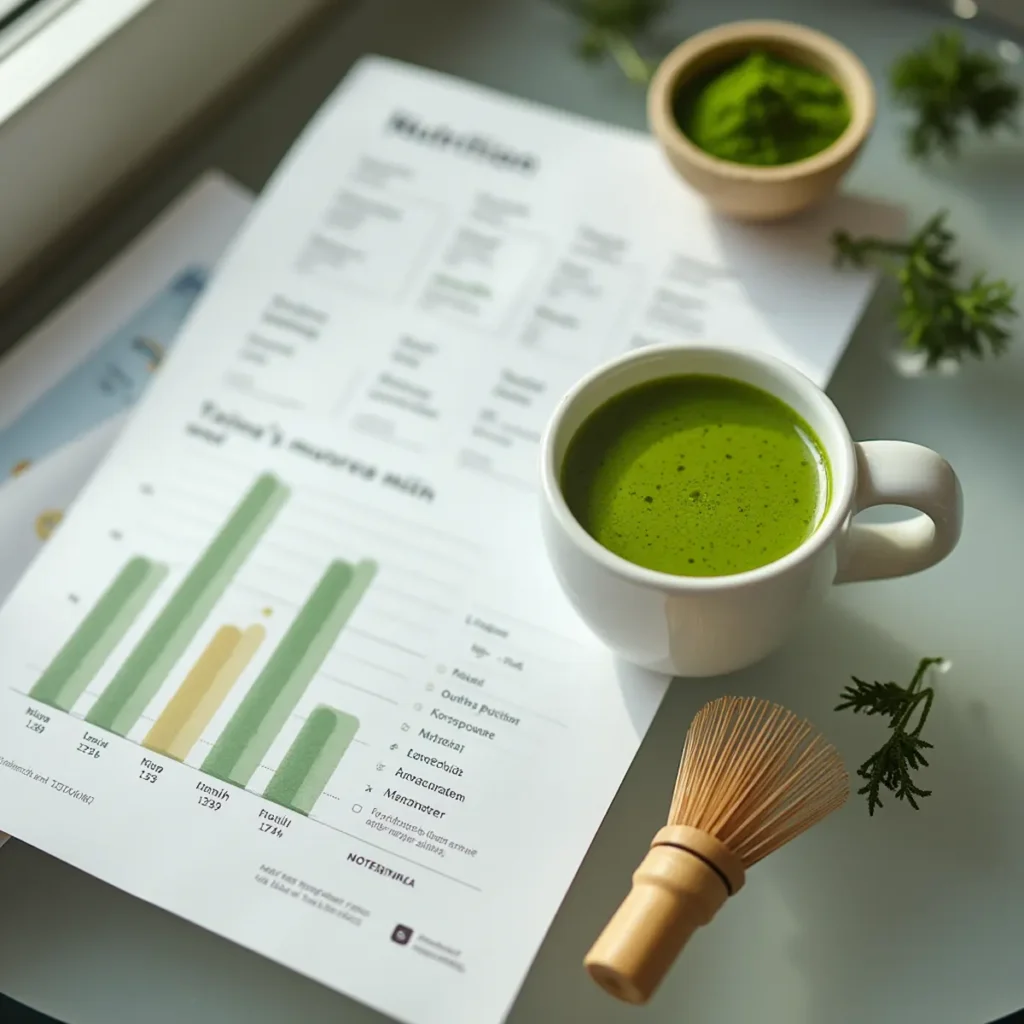
Breakdown of Calories, Sodium, and Antioxidants
- Calories: 25
- Sugar: 0g
- Sodium: 150mg
- Carbs: 5g
- Protein: 1g
- Fat: 0g
This recipe is vegan, gluten-free, and contains powerful detox nutrients like EGCG, gingerol, probiotics, and iodine.
Why Nutritionists Recommend This Over Store-Bought Detox Drinks
- No preservatives or chemicals
- Easy on the digestive system
- Delivers real nourishment, not artificial stimulation
Who Should (and Shouldn’t) Drink Japanese Mounjaro
Best Use Cases
- Busy parents seeking clean energy
- Students needing focus and alertness
- People managing weight naturally
- Anyone on a detox or plant-based diet
Warnings
- ⚠️ This article is for educational purposes only. While ingredients like matcha and ginger have been studied scientifically, this drink is not a medical treatment. Always consult your healthcare provider for personalized advice.
- ⚠️ Consult doctor if you have thyroid issues (iodine)
- ⚠️ Reduce umeboshi if limiting sodium
- ⚠️ Pregnant/nursing? Confirm with provider
- ⚠️ Use less matcha if caffeine sensitive
Japanese Wellness Culture and the Mounjaro Craze
How Traditional Wellness Shapes Modern Detox Trends
This drink follows Japan’s wellness model: slow, seasonal, and centered on prevention, not cure.
Why Japan Prefers Natural Remedies Over Prescription Alternatives
- No side effects or dependency
- Supports body long-term
- Respected cultural wisdom
Want more energy-boosting options? Don’t miss our Japanese Mounjaro Recipe Homemade: 7 Natural Steps for Authentic Taste for another powerful, plant-forward boost.
Science vs Tradition
The Wisdom of Japanese Wellness Traditions
For centuries, Japanese families have enjoyed the Mounjaro detox drink as part of their seasonal wellness rituals. It has been valued for restoring balance, supporting digestion, and providing gentle energy without the need for modern supplements. These traditions highlight the importance of prevention, mindfulness, and harmony with natural foods.
What Modern Science Confirms
Recent research provides scientific support for some of the traditional claims. Studies highlight the active compounds found in the key ingredients of this recipe:
Matcha Green Tea
- Rich in catechins like EGCG, which promote fat oxidation and metabolic support.
- PubMed, 2018 – Matcha Green Tea Drinks Enhance Fat Oxidation During Brisk Walking
- PubMed, 2020 – Three Weeks Daily Intake of Matcha Green Tea Powder Affects Exercise-Induced Metabolic Responses
Ginger
- Clinical trials show ginger accelerates gastric emptying and supports healthy digestion.
- PubMed, 2008 – Effects of Ginger on Gastric Emptying and Motility in Healthy Humans
- PMC, 2018 – Ginger in Gastrointestinal Disorders: A Systematic Review of Clinical Trials
Kombu Seaweed
- Provides iodine and minerals essential for thyroid function and metabolic balance.
- PMC, 2014 – Seaweed and Human Health
- PubMed, 2019 – Iodine Intake and Thyroid Disorders in Humans
Umeboshi Plums
- Traditional Japanese pickled plums, rich in citric acid and probiotics that may support gut health and immunity.
- PMC, 2017 – Antihypertensive Effects of Pickled Plum (Umeboshi)
- PMC, 2021 – Fermented Foods, the Microbiome, and Health
A Balanced Perspective
While both tradition and modern research highlight the potential benefits of the Japanese Mounjaro drink, it is important to recognize that effects are modest and vary between individuals. This recipe should be enjoyed as a wellness-supporting ritual, not as a substitute for professional medical treatment.
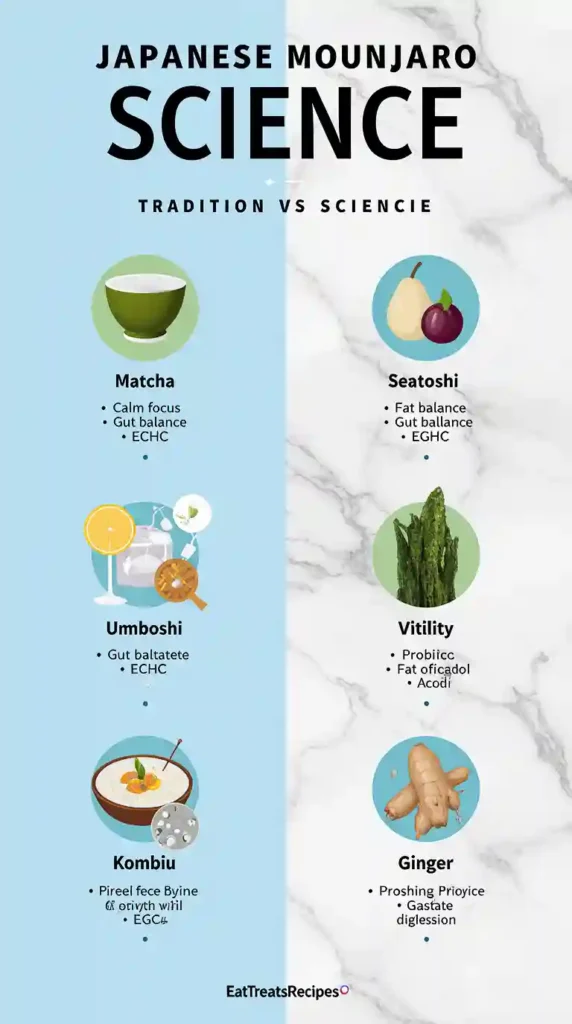
Frequently Asked Questions About the Japanese Mounjaro Recipe
How do you make Japanese Mounjaro?
Whisk 1 tsp matcha, 1 umeboshi plum, ginger, and kombu in warm water. Optional lemon or honey to taste.
Does natural Mounjaro work?
Yes – it boosts digestion and energy naturally with plant-based nutrition.
What ingredients are in Mounjaro?
Matcha, umeboshi, kombu, ginger all whole foods with health benefits.
What is the Brazilian Mounjaro?
It’s not a known health product. The Japanese version is rooted in cultural tradition and proven wellness practices.
Is the Japanese Mounjaro recipe safe during pregnancy?
The Japanese Mounjaro recipe uses natural ingredients like matcha, ginger, kombu, and umeboshi. While these are traditional foods, pregnancy requires extra caution. Matcha contains caffeine, kombu is high in iodine, and umeboshi is salty all of which may not be suitable in large amounts. Pregnant or nursing women should consult their healthcare provider before consuming this drink.
Does kombu seaweed affect thyroid health
Yes, kombu seaweed is naturally rich in iodine, which directly affects thyroid function. Moderate iodine is essential for a healthy thyroid, but excessive intake can disrupt thyroid balance. People with thyroid conditions such as hypothyroidism or hyperthyroidism should limit kombu and seek medical advice before adding it regularly to their diet.
What makes matcha different from regular green tea?
Matcha is a powdered form of green tea made from finely ground shade-grown tea leaves. Unlike regular green tea, where the leaves are steeped and discarded, matcha allows you to consume the whole leaf, giving you higher concentrations of antioxidants (like EGCG), amino acids (like L-theanine), and caffeine. This is why matcha provides a calmer, more sustained energy compared to regular green tea.
Is there a Natural Munjaro Recipe?
Yes. The Japanese version is considered the original natural Munjaro recipe, prepared with matcha, kombu, umeboshi, and ginger. Unlike pharmaceutical alternatives, it relies on simple, plant-based nutrition.
Can I find the Japanese Mounjaro Rezept in Deutsch?
Yes. In German searches, you’ll often see “japanisches Mounjaro Rezept” or “Japanese Mounjaro Rezept Deutsch.” Both refer to the same traditional detox drink with matcha and umeboshi.
References
[1] PubMed – Matcha Green Tea Drinks Enhance Fat Oxidation During Brisk Walking (2018)
[2] PubMed – Three Weeks Daily Intake of Matcha Green Tea Powder Affects Exercise-Induced Metabolic Responses (2020)
[3] PubMed – Effects of Ginger on Gastric Emptying and Motility in Healthy Humans (2008)
[4] NIH/PMC – Ginger in Gastrointestinal Disorders: A Systematic Review of Clinical Trials (2018)
[5] PMC – Antihypertensive Effects of Pickled Plum (Umeboshi) Containing High Citric Acid in Humans (2017)
[6] PMC – Fermented Foods, the Microbiome, and Health (2021)
[7] PMC – Seaweed and Human Health (2014)
[8] NIH – Iodine Intake and Thyroid Disorders in Humans (2019)
Conclusion: Why the Japanese Mounjaro Recipe Deserves a Spot in Your Daily Routine
This daily detox drink is rooted in centuries of wellness, made with simple, powerful ingredients: matcha, kombu, umeboshi, and ginger. Whether you’re looking to reduce bloating, boost energy, or reset your body the natural way, this Japanese tonic delivers slowly, sustainably, and effectively.
Whether you call it Japanese Mounjaro Recipe, japanese munjaro, or even the japanisches Mounjaro Rezept, this natural detox drink continues to bring together tradition and science. For anyone searching for the authentic natural Munjaro recipe, this blend of matcha, kombu, umeboshi, and ginger is the true original.
📌 Save the Japanese Mounjaro Recipe on Pinterest
Looking for inspiration later? Choose your favorite pin below and save it to your Pinterest board. Each design highlights the authentic Japanese Mounjaro Detox Drink with natural ingredients like matcha, kombu, umeboshi, and ginger.
👉 Click on your favorite image to pin it and keep the recipe handy!
📌 Authentic Japanese detox recipe 📌
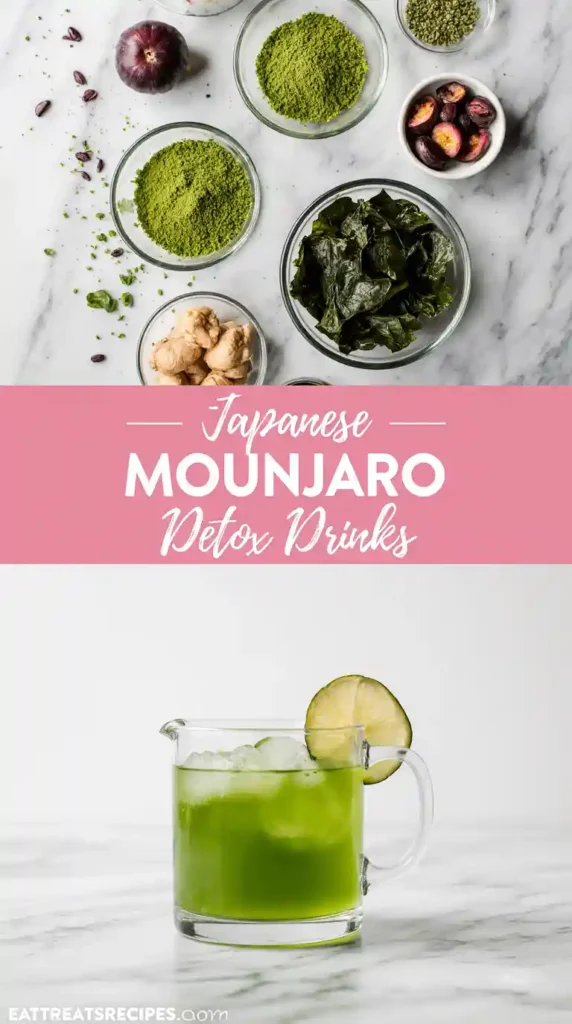
📌 Japanese detox tea 📌

📌 Wellness Japanese detox drink 📌
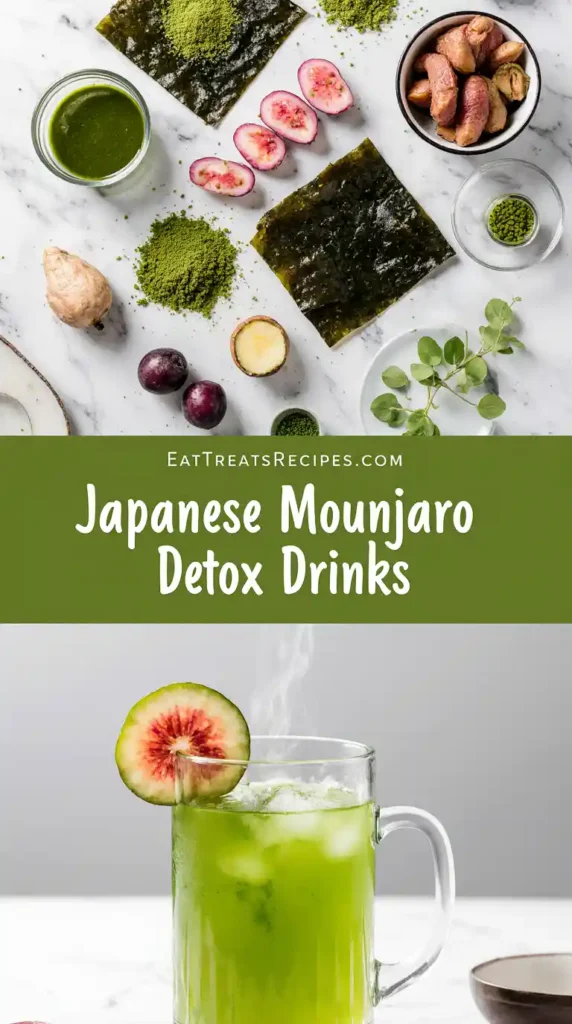
📌 Detox tea with umeboshi plum 📌

📌 Japanese inspired detox 📌

📌 Traditional Japanese detox 📌

📌 Natural detox tea 📌

📌 Detox matcha tea 📌

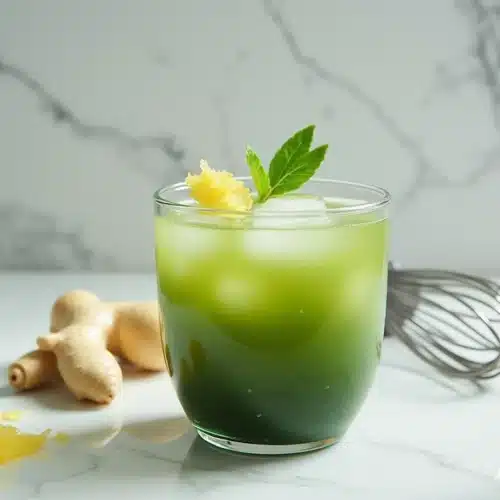
Japanese Mounjaro Detox Drink
Ingredients
- 1 teaspoon ceremonial-grade matcha powder
- 1 umeboshi plum or 1 teaspoon umeboshi paste
- 1 slice fresh ginger grated
- 1 thumb-sized piece kombu seaweed
- 8 oz warm water 160–170°F (not boiling)
- lemon juice or honey optional, to taste
Instructions
- Grate the ginger using a microplane or small grater for best flavor.
- Soak the kombu in 8 oz of warm water (160–170°F) for about 5 minutes to steep.
- Whisk the matcha powder with a small amount of warm water until frothy.
- Combine the whisked matcha, grated ginger, umeboshi plum (or paste), and steeped kombu water in a cup. Stir gently.
- Add lemon juice or honey if desired, and adjust to taste. Sip slowly and mindfully.
